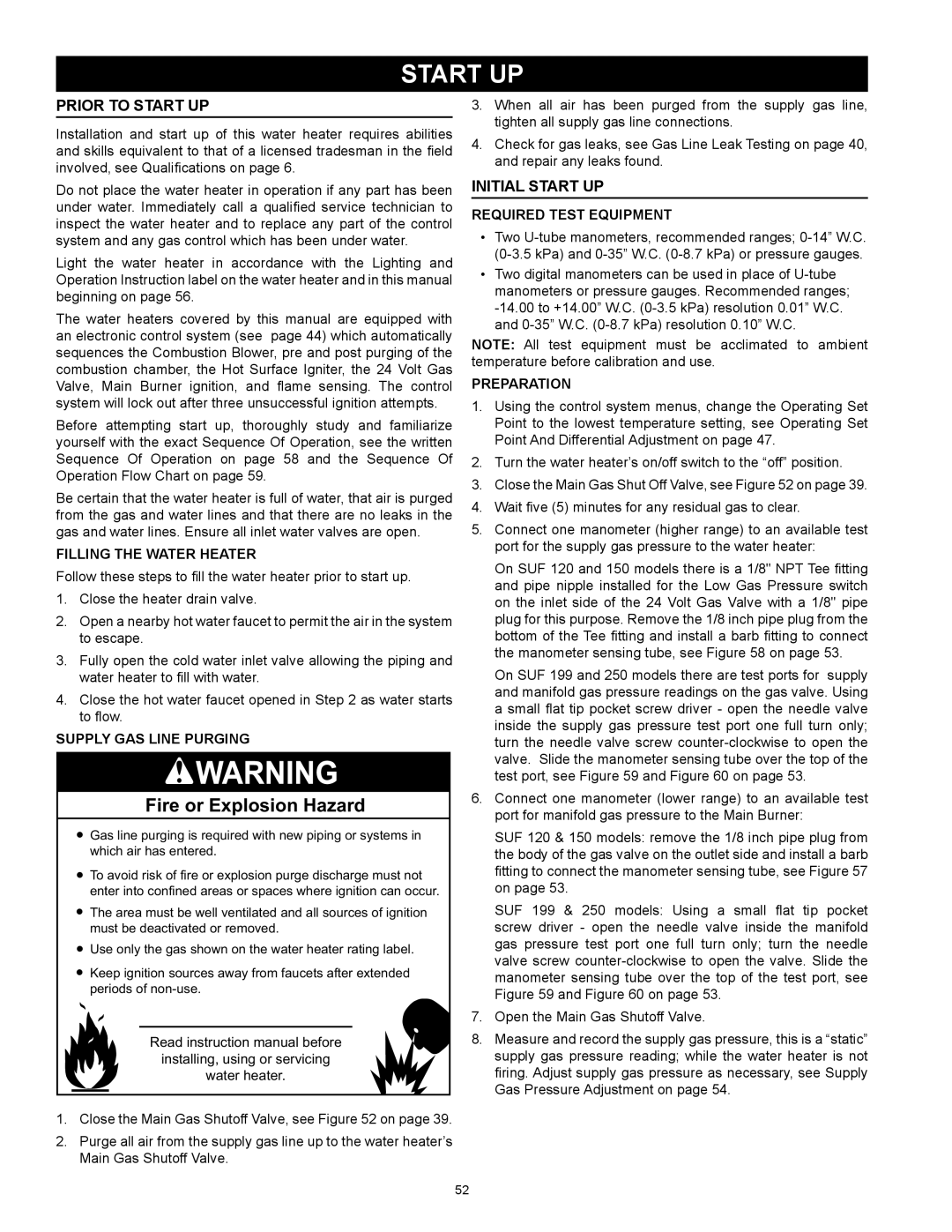
Start Up
Prior to Start up
Installation and start up of this water heater requires abilities and skills equivalent to that of a licensed tradesman in the field involved, see Qualifications on page 6.
Do not place the water heater in operation if any part has been under water. Immediately call a qualified service technician to inspect the water heater and to replace any part of the control system and any gas control which has been under water.
Light the water heater in accordance with the Lighting and Operation Instruction label on the water heater and in this manual beginning on page 56.
The water heaters covered by this manual are equipped with an electronic control system (see page 44) which automatically sequences the Combustion Blower, pre and post purging of the combustion chamber, the Hot Surface Igniter, the 24 Volt Gas Valve, Main Burner ignition, and flame sensing. The control system will lock out after three unsuccessful ignition attempts.
Before attempting start up, thoroughly study and familiarize yourself with the exact Sequence Of Operation, see the written Sequence Of Operation on page 58 and the Sequence Of Operation Flow Chart on page 59.
Be certain that the water heater is full of water, that air is purged from the gas and water lines and that there are no leaks in the gas and water lines. Ensure all inlet water valves are open.
Filling The Water Heater
Follow these steps to fill the water heater prior to start up.
1.Close the heater drain valve.
2.Open a nearby hot water faucet to permit the air in the system to escape.
3.Fully open the cold water inlet valve allowing the piping and water heater to fill with water.
4.Close the hot water faucet opened in Step 2 as water starts to flow.
Supply Gas Line Purging
Fire or Explosion Hazard
![]() Gas line purging is required with new piping or systems in which air has entered.
Gas line purging is required with new piping or systems in which air has entered.
![]() To avoid risk of fire or explosion purge discharge must not enter into confined areas or spaces where ignition can occur.
To avoid risk of fire or explosion purge discharge must not enter into confined areas or spaces where ignition can occur.
![]() The area must be well ventilated and all sources of ignition must be deactivated or removed.
The area must be well ventilated and all sources of ignition must be deactivated or removed.
![]() Use only the gas shown on the water heater rating label.
Use only the gas shown on the water heater rating label.
![]() Keep ignition sources away from faucets after extended periods of
Keep ignition sources away from faucets after extended periods of
Read instruction manual before
installing, using or servicing
water heater.
1.Close the Main Gas Shutoff Valve, see Figure 52 on page 39.
2.Purge all air from the supply gas line up to the water heater’s
Main Gas Shutoff Valve.
3.When all air has been purged from the supply gas line, tighten all supply gas line connections.
4.Check for gas leaks, see Gas Line Leak Testing on page 40, and repair any leaks found.
Initial Start Up
Required Test Equipment
•Two
•Two digital manometers can be used in place of
Note: All test equipment must be acclimated to ambient temperature before calibration and use.
Preparation
1.Using the control system menus, change the Operating Set Point to the lowest temperature setting, see Operating Set Point And Differential Adjustment on page 47.
2.Turn the water heater’s on/off switch to the “off” position.
3.Close the Main Gas Shut Off Valve, see Figure 52 on page 39.
4.Wait five (5) minutes for any residual gas to clear.
5.Connect one manometer (higher range) to an available test port for the supply gas pressure to the water heater:
On SUF 120 and 150 models there is a 1/8" NPT Tee fitting and pipe nipple installed for the Low Gas Pressure switch on the inlet side of the 24 Volt Gas Valve with a 1/8" pipe plug for this purpose. Remove the 1/8 inch pipe plug from the bottom of the Tee fitting and install a barb fitting to connect the manometer sensing tube, see Figure 58 on page 53.
On SUF 199 and 250 models there are test ports for supply and manifold gas pressure readings on the gas valve. Using a small flat tip pocket screw driver - open the needle valve inside the supply gas pressure test port one full turn only; turn the needle valve screw
6.Connect one manometer (lower range) to an available test port for manifold gas pressure to the Main Burner:
SUF 120 & 150 models: remove the 1/8 inch pipe plug from the body of the gas valve on the outlet side and install a barb fitting to connect the manometer sensing tube, see Figure 57 on page 53.
SUF 199 & 250 models: Using a small flat tip pocket screw driver - open the needle valve inside the manifold gas pressure test port one full turn only; turn the needle valve screw
7.Open the Main Gas Shutoff Valve.
8.Measure and record the supply gas pressure, this is a “static” supply gas pressure reading; while the water heater is not firing. Adjust supply gas pressure as necessary, see Supply Gas Pressure Adjustment on page 54.
52
